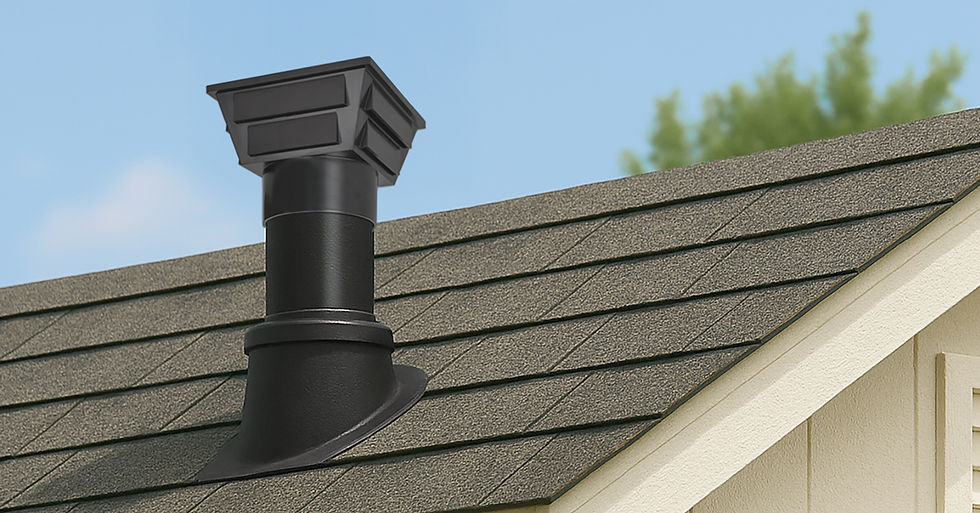How to Cool a Shed Without Electricity: 5 Solar Solutions for a Comfortable Space
- gagemiller19
- May 9
- 4 min read
If you’ve ever stepped into a shed in the middle of summer, you know how stifling it can get. Without insulation, airflow, or power, sheds often trap heat—creating an environment that's unbearable and even damaging to tools, supplies, or plants. But what if you could cool your shed without running electricity?
Good news: with today’s solar technology, it’s easier and more affordable than ever. In this guide, we’ll explore five smart solar-powered solutions to cool your shed effectively—ideal for off-grid buildings, greenhouses, and portable restrooms. And if you're looking for a high-performance option that requires zero wiring, the Johnny Hat by Spartan Sol may be exactly what you need.

Why Sheds Overheat (and Why It’s a Problem)
Sheds are typically built with cost efficiency in mind, not comfort. Most have:
Thin walls or metal exteriors that absorb and trap heat
No insulation or ventilation
Little to no natural airflow
The result? Interior temps can soar 20–40°F higher than the outside temperature. This can cause:
Warped tools and damaged supplies
Unsafe storage conditions for flammable items
Dehydrated plants or seedlings (in garden sheds or greenhouses)
Mold, mildew, and musty odors
Uncomfortable working conditions
The Solar Advantage: Cooling Without Electricity
Cooling a shed without electricity is a challenge—but not an impossible one. Solar-powered ventilation and cooling solutions are a perfect fit for small, standalone structures like:
Storage sheds
Garden greenhouses
Off-grid cabins
Portable restrooms
Tiny homes
Solar tech has become increasingly efficient, affordable, and user-friendly. Here are five top solutions that can transform your hot shed into a more usable space—without connecting to the grid.
1. Install a Solar-Powered Exhaust Fan (Best All-Around Solution)
The most effective way to cool a shed without electricity is by removing hot air and encouraging airflow—and a solar exhaust fan does just that.
What It Does:
Pulls hot, stagnant air out of the shed
Circulates fresh outdoor air
Lowers interior temperature by up to 20–30°F
Reduces moisture and prevents mold
Recommended Product: The Johnny Hat by Spartan Sol
100% solar-powered exhaust fan and light combo
No wiring, batteries, or maintenance
Designed for sheds, greenhouses, port-a-potties, and more
Patent-pending design maximizes airflow with minimal setup
DIY-friendly—installs in minutes with just a few screws
2. Use a Solar-Powered Attic Vent or Roof Vent
Solar attic fans aren't just for houses—they work great in sheds, too. These units mount to the roof and kick on automatically when the sun hits the solar panel.
Pros:
Powerful airflow
Great for larger sheds
Operates only during sunny conditions (when heat is highest)
Cons:
May require roof cutting or modifications
Can be more expensive and complex to install than all-in-one units like the Johnny Hat
3. Louver Vents and Other Passive Cooling Systems
While not mechanical fans, solar louver vents and passive ventilation windows can work with exhaust fans to create cross-ventilation.
Tips:
Place vents low on one wall and exhaust fans high on the opposite wall
Keep interior doors open to promote air exchange
4. Install Reflective Insulation + Solar-Powered Fans
Combining insulation with solar-powered ventilation enhances overall cooling performance.
Reflective Insulation:
Reflects up to 97% of radiant heat
Easy to install behind walls or on ceilings
Works well in conjunction with solar fans
Why It Works:
Insulation slows heat gain
The fan removes hot air that still makes it inside
5. Solar-Powered Portable Air Circulators or Blowers
Some small sheds benefit from solar-powered portable fans or circulators, which are less permanent than exhaust fans but still helpful.
Features:
USB or direct solar panel connection
Ideal for small enclosed spaces (potting sheds, mini greenhouses)
Can be moved from shed to RV to tent
These are typically less powerful than roof-mounted exhaust systems but can work well in tandem with passive vents.
How to Choose the Right Solar Cooling Solution for Your Shed
When deciding which solar-powered solution is right for your space, ask:
How big is your shed?
Small (under 100 sq. ft.): Johnny Hat or solar portable fan
Medium: Johnny Hat + passive venting
Large (200+ sq. ft.): Attic fan + insulation + cross-ventilation
Is your shed used for people, plants, or storage?
Plants: prioritize consistent air movement
Storage/tools: focus on heat and humidity control
Frequent human use: combine fans + insulation for comfort
Do you need lighting too?
Choose a combo unit like the Johnny Hat with built-in LED lighting—perfect for after-dark shed access
Why the Johnny Hat Is the Best All-in-One Solution
Unlike traditional solar fans, the Johnny Hat by Spartan Sol was designed specifically for small, standalone buildings like:
Storage sheds
Portable toilets
Chicken coops
Greenhouses
Hunting blinds
Key Benefits:
No wiring or batteries needed
Installs in under 15 minutes
Dual function: powerful exhaust fan plus a solar-powered LED light
Weatherproof design withstands heat, rain, and UV rays
Cost-effective alternative to powered ventilation systems
Whether you’re battling heat in your backyard workshop or improving sanitation in a mobile restroom, this patented solar ventilation system gets the job done—without needing a power
Conclusion: Stay Cool the Sustainable Way
Keeping a shed cool without electricity isn’t just possible—it’s practical, affordable, and sustainable. By using solar-powered ventilation and smart passive cooling, you can turn any shed or outdoor building into a safer, more comfortable space.
For the most effective, easiest-to-install option on the market, check out the Johnny Hat by Spartan Sol—a patented, all-in-one solar fan and light system that helps you go off-grid without compromise.





Comments